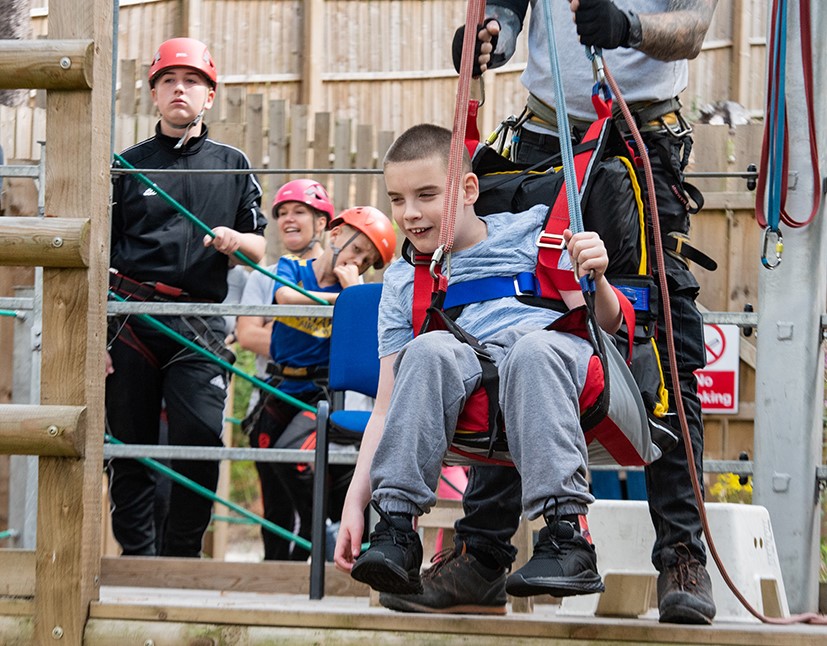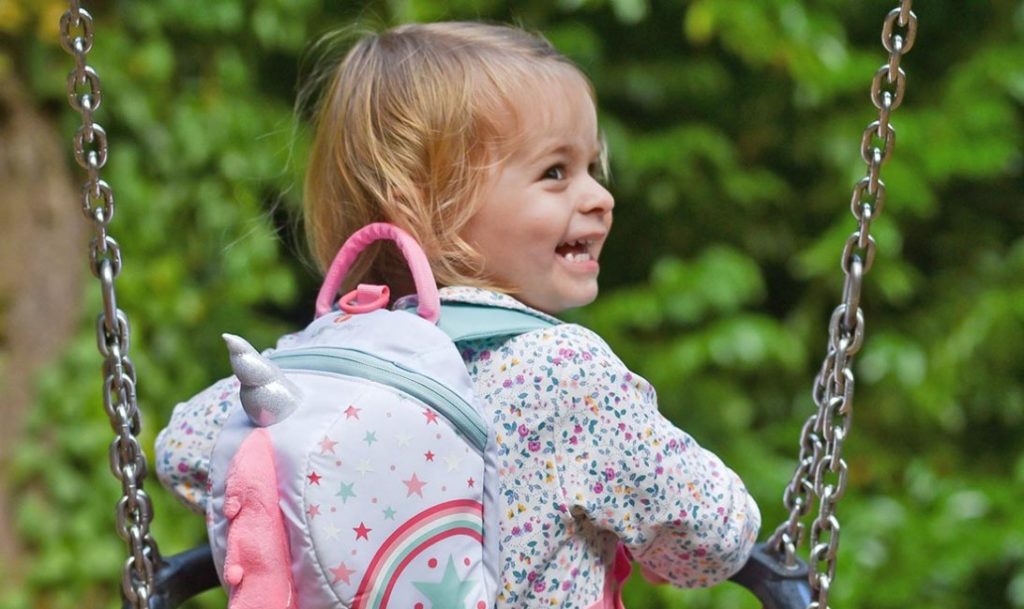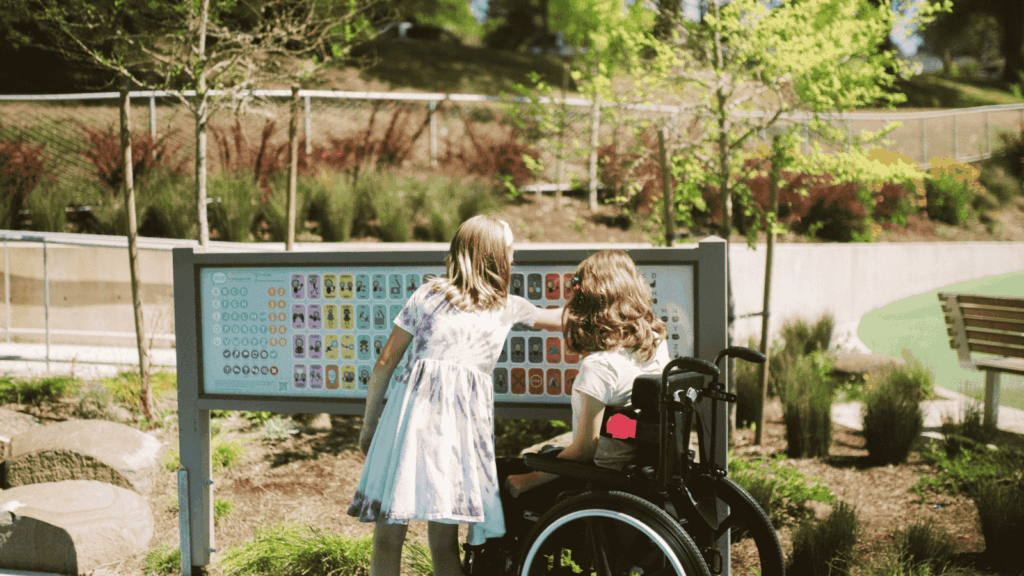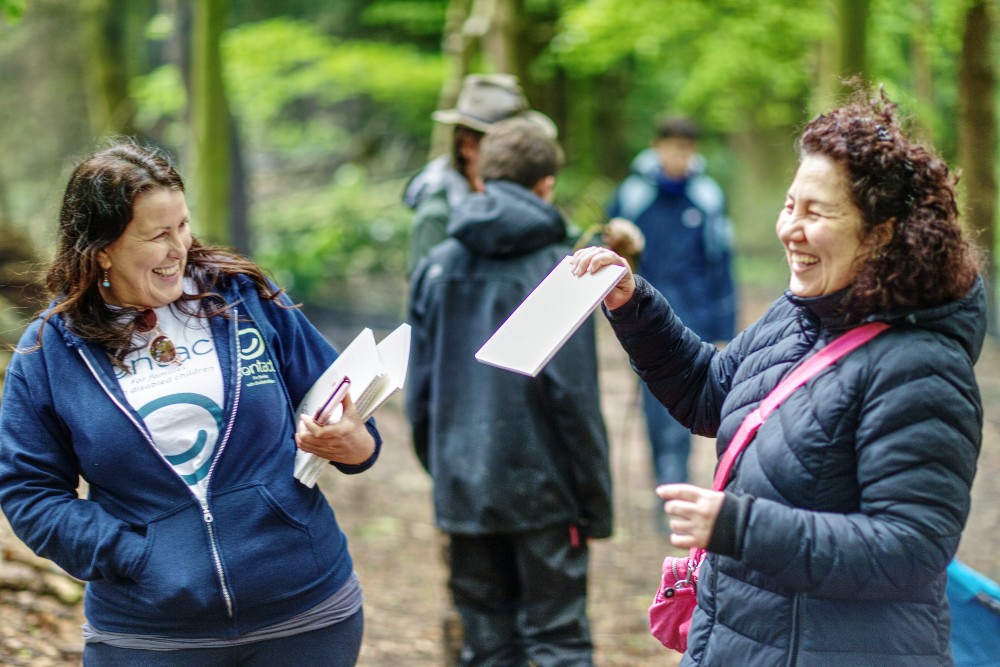Holidays, play and leisure
11 mins read
This advice applies across the UK.
All children need the chance to play. Many disabled children and young people say that leisure and play – after school, in the holidays and at weekends – is the most important missing element in their lives. On this page, we have information about what play, leisure, and short breaks options may be available, and where to find more information.

In this article
What support can I get?
“Plan it with precision, patience and persistence… but make it happen! It is so worth it.”
Play has an important role in a child’s development. Play can help develop speech, sensory skills, imagination, independence and social skills.
All children, whatever their abilities, have the right to play, have fun and take part in recreational activities. Local authorities must support children who need practical help to play or to access certain activities and leisure facilities.
Help can include access to:
- Toy libraries.
- Adventure playgrounds.
- Special equipment.
- Holiday schemes, for example holiday clubs organised by the local authority.
With additional support, some disabled children can access mainstream leisure facilities such as swimming pools and sports activities.
Who to ask about play and leisure services in your area
England and Wales
Your local Family Information Service can tell you what’s available near to you.
In England, every local authority must publish a ‘local offer‘ of services for families with disabled children, including information about leisure activities. Find this on your local authority’s website.
Northern Ireland
Family Support NI has information on play and leisure activities for disabled children.
Our team in Northern Ireland can also give you information about play and leisure in your area.
Scotland
Most local authority’s have information on play and leisure on their website under ‘Family Information Service’.
Our team in Scotland can also give you information about play and leisure in your area.
Support groups and carers centres
You can also contact your local parent support group or carers centre. Some run their own activities, and if not, may know who does.
Or you can ask your child’s social worker. If you don’t have one, contact your local children with disabilities team.
Schemes to help your child access play and leisure activities
Entertainment, arts and culture
- The Max Card offers free or discounted access to days out for families with disabled children.
- VocalEyes (England) audio description captures visual elements of arts and culture activities for blind or partially-sighted people.
- Stagetext – captioning and live speech-to-text services in arts and cultural venues for deaf people.
- Seatplan has access guides and reviews for UK theatres.
- Cinema Exhibitors’ Association Card entitles the cardholder to one free ticket for a person to go to the cinema with them.
- Autism-friendly cinema screenings for people with autism or sensory sensitivity to go to the cinema.
Days out
Many major attractions allow a parent or other carer accompanying a disabled person free entry. You can usually find accessibility information on their websites. It’s worth giving places you want to visit a call. They can tell you about accessibility and documents you might need to take advantage of any offers.
“We went to a Rare Breeds Farm. It was gorgeous in the sunshine cuddling new born lambs.”
Some museums and attractions operate ‘early bird’ sessions, where families with autistic children or children with sensory conditions can attend before they get crowded or noisy, to minimise distress. You should be able to find out on their website.
These free resources may help you plan:
- Rough Guide to Accessible Britain from Motability
- AccessAble – search for accessible places to go by place, town or postcode
- The National Trust – Access for everyone
- Woodland Trust
Specialist disability activities
Local play and leisure facilities should be accessible for disabled children. However, you may wish to access more specialist activities for your child. Here are a few ideas:
- NHS ideas for accessible family activities, for example disability swimming and inclusive cycling
- Riding for the Disabled
- Disabled Photographers’ Society
- Whizzkidz activity programmes like music, dance, cooking for young wheelchair users.
- Seagull Trust accessible canal cruises (Scotland).
Disability sport and fitness
Check your local authority website for information on sports in your area. The organisations below may be of interest:
- Level Playing Field charity for disabled fans of football, rugby union, cricket, rugby league and tennis
- Special Olympics Great Britain
- Disability Snowsport UK
- Sailability, Royal Yatching Association
- Ski 2 Freedom
- Freedom in the Air gives disabled youngsters the chance to fly
- Aerobility offers a trial flight, a fun aviation education session or a trip in a flight simulator
- Disability Sport Wales
- Disability Sport Northern Ireland
- Scottish Disability Sport
- Cerebral Palsy Sport (CP Sport) sport and physical activities for people with CP in England
- NHS links to sporting organisations for specific conditions such as British Blind Sport, Mencap Sport
- British Cycling supports cycling for disabled people and para cycling
- Inclusive Football – directory of inclusive and disability football teams
- British Judo runs adaptive Judo for disabled people
- Lawn Tennis Association – wheelchair, deaf, visually impaired, learning disability and para-standing tennis.
- British Water Ski and Wakeboard runs adaptive waterski and wakeboard activities
“Special needs football. Son loves it!”
Equipment and mobility
Your child may need certain aids, equipment and adaptations to help them access play and leisure opportunities.
For help in choosing the right equipment or for information about getting around, the following organisations may be helpful:
- Fledglings has products and equipment to help with getting out and about
- Whizz-Kidz provides wheelchair and mobility equipment to children and young people across the UK
- Wizzybug is a specialist powered indoor/outdoor wheelchair provided via a FREE loan scheme to children aged 14 months to 5 years by the charity Designability. Parents can self-refer by completing the application form on the Wizzybug website
- British Red Cross provides wheelchair hire and short-term loans of equipment
- Bugzi loan scheme, an indoor-powered wheelchair for children up to about 6 years old
- Disabled Motoring UK has information about travel around the UK, and how to find a disability-friendly car park
- UK Government disability transport information on using different types of transport.
Finding a toilet
If your child needs an accessible toilet, these schemes may help:
- The Radar key offers disabled people independent access to locked public toilets around the UK
- Changing Places toilets have a changing bench and a hoist and are large enough for a carer to assist
- Mobiloo is a portable Changing Places toilet with an assistant, and list which events they’re attending.
Find an accessible toilet when you’re out and about by using these free resources:
- Changing places map
- Accessaloo app
- Changing Places app
- Flush toilet finder app
- Find an accessible toilet near you – searchable website with opening times and status of toilets.
Short breaks
A short break allows your child to have a change of scene, try different experiences, have fun and make friends. Short breaks are also an opportunity for you to recharge batteries, spend time with friends and family, or pursue your own interests. Parents tell us they are vital for family life.
Short breaks can include playgroups, opportunity groups, out of school and weekend clubs and access to play schemes. They may include stays away from home at residential homes or special units in hospitals and hospices. Family link schemes are where your child stays with another family on a regular basis or occasionally.
Find out more about short breaks, including how to access them.
If your child needs short breaks, your local authority can give you payments to buy the service yourself.
“Taking a break is the difference between sinking and surviving. It makes me sing out loud, I’m so happy. I look forward to it, I enjoy it, I bask in it afterwards!”
Indoor play and leisure resources
“Have a list of activities your kids enjoy and do a rainy day alternative.”
Toys and indoor play activities can be fun as well as educational and therapeutic.
Toys, play and development
For advice on suitable toys, speak to a paediatric occupational therapist. Through activity and play, the therapist works with children to help them attain the highest possible quality of life. They may work in a variety of settings including the NHS, social services, educational or charitable organisations.
There may be also be a local play scheme or parent support group in your area where toys and ideas can be shared or exchanged.
Toy libraries
Local toy libraries are usually free for children who access local services, (such as portage, or speech and language therapy), or who receive Disability Living Allowance, or are on the local children’s services register. Search online to find your local toy library.
You can borrow a range of sensory toys and equipment. The toy librarian can help you choose toys for fun and development. Good quality toys and sensory equipment are often expensive to buy for children with additional needs, so being able to borrow them is useful. Toy librarians can also signpost you to local play and leisure services and, in some areas, run their own play sessions.
Sensory play at home
Many disabled children enjoy visiting sensory or soft play rooms. You may be able to recreate a low-cost sensory room for your child at home. First, find out which elements of sensory equipment are most attractive to them. Make a wish list of the equipment you feel will really benefit them and shop around. Sensory toys and equipment can be expensive but can be bought on a budget. A little imagination and creativity can go a long way!
Here are some ideas of activities you can do at home:
- NHS ideas for accessible games and activities to do at home
- Fledglings have a wide range of toys and sensory equipment
- Calibre Audio Library lends free audiobooks to anyone who has a print disability
- Living Paintings free postal library for blind and partially sighted people in the UK
- Disability Arts Online
Help to pay for leisure activities
Discounts and concessions
Certain benefits can lead to help to access leisure opportunities, such as discounts on road tax and help with parking. Local councils may also offer other concessions, like free bus travel. Many local attractions offer discount schemes and queue-jump passes for disabled people and their carers.
Find out more about transport and leisure discounts
Holidays
Everyone needs a change of scene from time to time. Some holiday companies provide holidays and accommodation designed specifically to meet the needs of families with disabled children. These include fully accessible adventure holidays with outdoor activities, such as canoeing, horse riding and abseiling, to suit all levels of ability. You can find them by searching online.
- Tourism for All has information about accessible holidays, day trips and attractions.
- Help at the airport and support for your journey
- Autism-friendly holidays and days out, and how to make holidays easier for autistic people
- Over the Wall free UK activity camps for seriously ill children, siblings, and their families over the summer holidays.
Travel insurance
Suitable travel insurance is essential if you’re going abroad:
Scope has information and tips on what to look out for when buying travel insurance.
“Ellie has Rett syndrome. She quickly understood that the morning trip to the boulangerie was followed by croissants dipped into hot chocolate – her new favourite treat.”
Help to pay for holidays
Your local authority/health and social care trust
Families with disabled children may be entitled to help towards a holiday from local social services departments. The main route to getting help with holiday costs involves having an assessment of your child and family’s needs.
Some authorities may give grants towards holiday costs, while others may offer holidays at places of your own choice. Some local authorities/trusts insist on means testing and, even when grants are available, they are usually small.
Charitable grants and wish-granting charities
Some charities give grants to help towards holiday costs. The Family Fund may help towards holiday costs for a family of a disabled or seriously-ill child aged from birth to 17 years old.
Other charities grant wishes or dreams or offer special treats or holidays for children who are very ill or living with severe disabilities.
“Carve out something for you. You will need to plan ahead, dig deep financially, emotionally and really want it, but finding time to have a break will help.”

Out & about products at Fledglings
Visit our partner shop for products to make life easier for days on-the-go.
Related information

Transport & leisure discounts
Information about help with parking, getting a car, paying road tax and rail and bus travel, as well as advice on saving…
Read more
Better Together events
Our series of fun and engaging activities for families with children with additional needs.
Read more